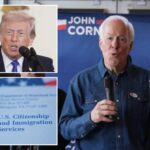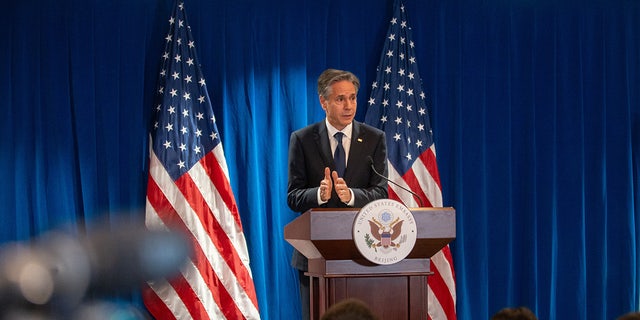
Chinese officials reportedly pressed Secretary of State Antony Blinken on Washington’s stance regarding the upcoming 2024 elections in Taiwan during his trip to Beijing last week.
Though Blinken maintained that the Biden administration would keep an even-handed stance and does not support any meddling, Chinese officials sought to induce Washington’s cooperation against Vice President Lai Ching-te, considered by Beijing as a member of the “pro-independence” wing, The Wall Street Journal reported Sunday.
Lai, the presidential candidate of the incumbent Democratic Progressive Party (DPP), is considered more aggressive in advocating for Taiwanese independence compared to current President Tsai Ing-wen. Tsai cannot seek re-election due to term limits.
According to the Journal, sources said Chinese officials said when then-President George W. Bush sat in the Oval Office next to then-Chinese Premier Wen Jiabao in 2003, he cautioned then-Taiwan president and DPP leader Chen Shui-bian against raising pro-independence sentiment. Taiwan’s 2024 election, scheduled for next January, was a major topic of discussion during Blinken’s meetings with Chinese officials, Journal sources briefed on the matter said.
BLINKEN: WAGNER MARCH RAISES ‘PROFOUND QUESTIONS’ AS ‘MORE CRACKS EMERGE IN THE RUSSIAN FAÇADE’
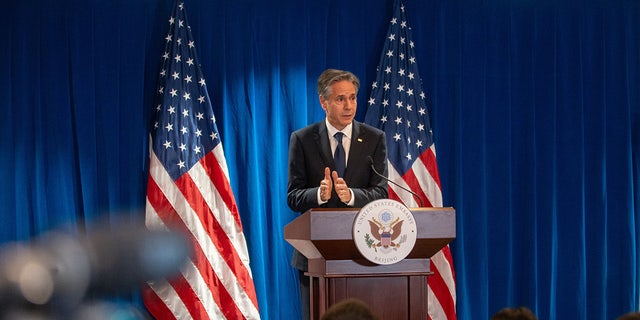
Secretary of State Antony Blinken speaks during a news conference in Beijing, China, on Monday, June 19, 2023. (Andrea Verdelli/Bloomberg via Getty Images)
Chinese officials also reportedly grilled Blinken on whether the U.S. had vested interested in the outcome of Taiwan’s election and if the United States considered the DPP to be a friend.
In Beijing, during the first trip made by a U.S. secretary of State in five years, Blinken met with Chinese President Xi Jinping, Chinese Foreign Minister Qin Gang and Wang Yi, Xi’s top foreign-affairs official. In remarks made after meeting Xi, Blinken reaffirmed to reporters that the United States does not support Taiwan’s independence.
China and the U.S. in recent years have been cycling in and out of diplomatic flare-ups regarding the Taiwan Strait. China has used measures ranging from cutting diplomatic ties to staging military maneuvers off Taiwan to show its displeasure, according to The Associated Press.
BIDEN STANDS BY CALLING XI A ‘DICTATOR’ AFTER COMMENT ANGERS CHINA
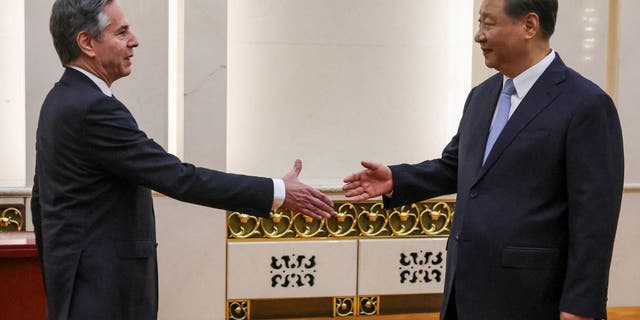
Secretary of State Antony Blinken shakes hands with China’s President Xi Jinping in the Great Hall of the People in Beijing on June 19, 2023. (Leah Mills/Pool/AFP via Getty Images)
Last week, Reuters reported that internal security reports from Taiwan’s government warned that China will attempt to interfere in the January elections by “illicitly funding Beijing-friendly candidates using communications apps or group tours.”
Meanwhile, President Biden on Thursday defended his harsh public comments on China, including calling Xi a dictator just days after Blinken met with the Chinese president, saying his words would have no negative impact on U.S.-China relations and that Biden himself still expects to meet with Xi sometime soon.
In an appearance on CNN’s “State of the Union” Sunday, host Dana Bash asked Blinken if he believes Xi is a dictator.
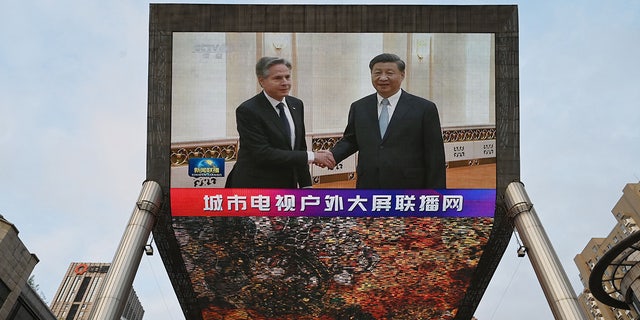
A China Central Television news broadcast shows Secretary of State Antony Blinken meeting with President Xi Jinping. (Greg Baker/AFP via Getty Images)
“The president speaks clearly. He speaks candidly. I’ve worked for him for more than 20 years, and he speaks for all of us,” Blinken said.
CLICK HERE TO GET THE FOX NEWS APP
“The purpose of the trip at the president’s instruction was to try to bring a little bit more stability to the relationship, to demonstrate that we’re committed to managing it responsibly, which really is an obligation for us and an expectation that countries around the world have and to be able to deal very directly with our differences. There’s no secret about those differences,” Blinken added. “There’s no secret about concerns we have about democracy, about human rights, about some of the actions that China is taking around the world and being able to have better, stronger, sustained lines of communication means we can talk about these differences directly.”
The Associated Press contributed to this report.





